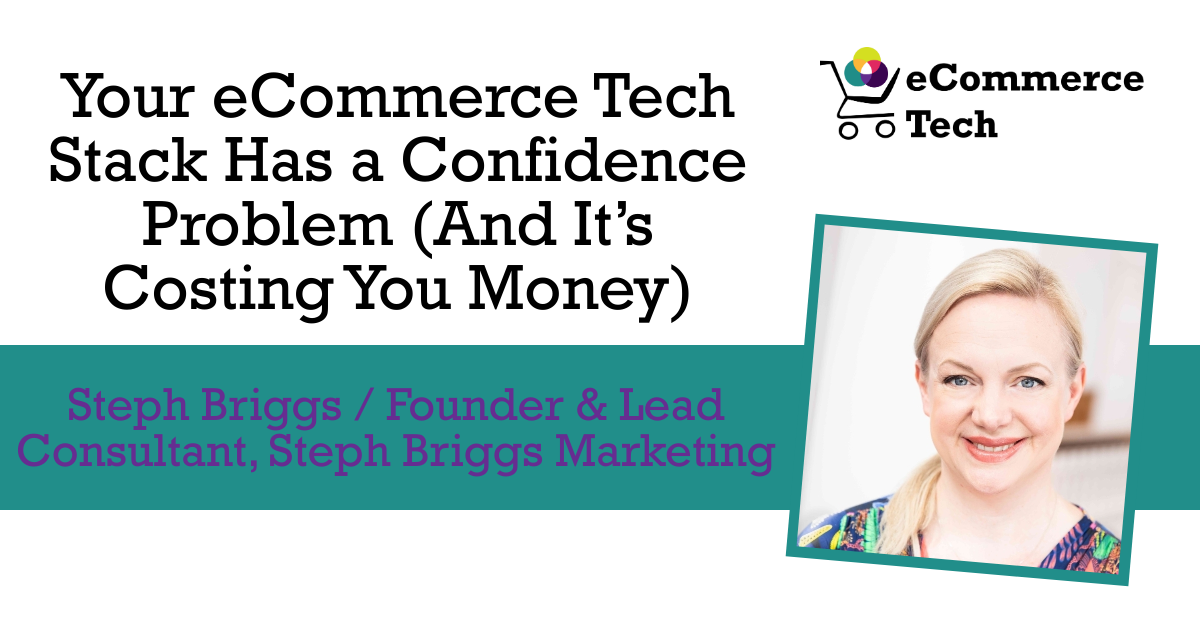Find the Recommended Tools for Launching Your Shopify Store and Understand How Tech Costs and Your Tech Stack Will Change As You Grow
Original video from the virtual event: "How to Get Your First 100 Customers on Shopify." Full video here.
Congratulations, you've decided to risk your time and money on launching an eCommerce store...
The first thing to know is that you're very likely to fail (see Rant One below)...
But there is hope. If you have the right skills, resources, market dynamics, and...
The right tools.
The Shopify app ecosystem has thousands of apps designed to help you launch and grow your store... And that's the problem.
Having researched and launched stores myself, and the fact that my entire job relies on me understanding the Shopify app ecosystem better than anyone else, I've compiled my recommended list of starting tools, and this is very budget-friendly.
Let's get into it... But first...
Rant One: Why You're Going to Fail and How to Stop It

Here's 6 reasons you're going to fail:
- You don't have enough money to make it to profitability.
- You can't get lifetime value above your cost of acquiring a customer.
- You don't differentiate yourself in any meaningful way.
- You have supply chain and other operational overhead that sinks cash flow.
- Others copy your idea and your margin goes away.
- You give up because this is the hardest thing you will ever do in your life.

Success isn't magic, it's largely a function of these 3 factors:
- Skill
- Resources
- Market Dynamics
Invest in each of these until you've got a minimum of 5/10 average, and this will significantly decrease your chances of failure.

To start with, map your own skillsets on a spider graph and visualize your strengths and weaknesses.
If you're a solo founder, you may be really good at many things, but you don't have enough time in the day to do them all. For that reason, I recommend cutting all numbers in half.
From here, improve your weaknesses, take courses, whatever it takes. And prioritizing hiring for gaps in your own skillset.
Understanding The Shopify App Ecosystem
All tools can be broken into two main categories:
- KPI driven tools, which improve a value metric in your business and should impact revenue, growth, and/or margin.
- Time saving tools, which free up your human capital to focus on other activities.
Be clear on which type of tool you're looking for. Most of the time it should be KPI driven, but if you're considering switching providers, it could be more for a time saving reason.
How to Choose the Right Shopify Apps For Your Store
When looking for a tool that fits with your store, you should prioritize for these 6 questions:
1. Is it built for eCommerce?
If not, it may be missing key integrations and features. We want solutions that understand the unique problems of eCommerce, because they aren't the same as B2B...
2. What is their focus metric?
Find the one metric this tool "promises" to increase and tie that back to the value it will provide to your business, hopefully directly back to revenue. At the worst, tie it back to customer satisfaction.
Bonus: Define the expected impact of the tool and report back on its' success or failure.
3. Do you have the resources and know-how to properly execute and use this tool to its fullest?
If not, should you hire additional resources, or should you shelve this tool until you have more time.
4. Are they priced fairly for the value they provide? Are they priced on a value metric? Are you paying for features that you already have / don't need?
If you're paying for two tools that do the same thing, there's a cost waste, and typically some convolution between the tools. Figure out if this tool covers exactly what you need. While you want to prepare for growth and enacting "cool" features in the future, it's important to be able to compartmentalize what you need today from what you need tomorrow.
5. How do the features differentiate from competitors?
If it's unclear, I'd typically go with a market leader, best funded, or best reviewed.
6. Does this tool fit with the rest of your tool stack?
It's more important than ever that all of your tools talk to each other. Make sure it integrates with your core apps appropriately. Make sure the sales rep isn't saying "yes," but really means that you have to use a webhook or Zapier (both are workarounds when you don't have a direct integration, which is always preferred).
Your Starting Shopify App Tech Stack
Finally, what you've been waiting for, my suggestions on a starting stack for your new Shopify store.
This lineup will cost you a worthwhile $37.98/month investment, and it will help bring your starting store up to industry standard best practices.
Last updated: 6/27/19
Privy
Now that you've got email marketing squared away, you will want a clever way to capture email addresses. This is where Privy comes in: Email capture and on-site conversion rate. It integrates with Klaviyo and Octane, so that you can capture email addresses, and other valuable information. And then the magic happens: Segmentation and personalization. From here, show cat lovers cat photos, and dog lovers dog photos. Men see men's clothes. Women see women's clothes. You getting the picture?
Privy Pricing: Free up to 5,000 page views/month.
PushOwl
Web push notifications are proven to increase conversion rates. Now, I know you're thinking these things are annoying, but the truth is, if you choose the timing appropriately, they are beneficial. You especially want to setup the out of stock notifier, and the abandon cart sequences.
PushOwl Pricing: Free up to 500 impressions a month.
Octane AI
Messenger marketing is a powerful channel that can engage customers, create a personalized experience, and really open up a whole new avenue for growing your store. This is a tool that is only as powerful as the person that wields it. You have to make the investment into Messenger marketing, to get substantial value from it.
Octane Pricing: $9/month up to 250 monthly active users (engaged, not just subscribed).
Klaviyo
Email marketing for eCommerce has never been easier. Klaviyo comes locked and loaded with sequences for key stages of the customer journey. Spend a few hours customizing and launching these sequences, and integrating Klaviyo with your email capture and Messenger marketing tools.
Klaviyo Pricing: Free up to 250 contacts.
Spently
While Klaviyo rocks at email marketing, it neglects (as do most store owners) your Shopify notification emails. These are your transactional emails that are automatically sent out by Shopify. Spently helps you brand and optimize these so that you close more sales and increase retention.
Spently Pricing: Free up to 50 orders a month.
Fera AI
Privy helps with pop-up conversion and segmentation, but what about tweaking your product detail page, or checkout page. Maybe add some urgency, or well-timed social proof. Fera is the perfect A/B testing tool that gives you access to 100s of proven skills for increases conversion rate optimization.
Fera Pricing: $9/month up to $5,000/month in sales.
Bold Upsell
We're optimizing our store for increasing sales, but we also want one customer to buy more. Use Bold Upsell, in conjunction with Bold Brain, to find the right products to suggest at the right stage of the customers journey. Move customers that were going to buy 1lb of coffee up to the 2 lb bag. Or maybe they need more coffee filters. The possibilities are only limited by your product catalog.
Bold Upsell Pricing: $9.99/month up to 200 upsell views.
Loox
You've got a new store, and one of the most important things you can do, is get more social proof on your product detail pages. Loox is a photo review app so that you can get the review and the picture of the customer using the product, which is great for social media, on-site social proof, and it actually helps retain that customer.
Loox Pricing: $9.99/month for 100 review requests.
Smile
What would help incentivize a photo review? How about if you give each new customer "points" for reviewing the product and store experience? Smile is a retention and loyalty tool that is very easy to setup and will truly incentivize referrals and repeat purchases.
Smile.io Pricing: Free, but with limited functionality.
GetCarro
Influencer marketing, so hot right now... But you don't have the budget for that, or do you? GetCarro is an influencer marketing platform designed to help you identify which of your customers are also influencers. 🤯 Focus on the influencers that already care about your products and you're very likely to get raving reviews, for cheap or free.
GetCarro Pricing: Free, with paid features coming soon.
Final Thoughts
Are there more apps that you may need?
Absolutely, but I believe the above apps round out a great starting stack for any new Shopify store.
You're going to want many of the native (created by) Shopify apps for Facebook and Google Shopping.
Some other really common ones are going to be in Shipping, Dropshipping, Accounting, and "online house keeping."
Things like Stamps, Shipstation, Oberlo, Quickbooks, SEO Image Optimizer, Alt Text, etc.
And as you grow, you should expect to add additional tools to the stack.
At $20k/month in revenue, we estimate you will spend approximately $1,127 in monthly tech spend.
At $50k/month in revenue, we estimate you will spend approximately $1,986 in monthly tech spend.
At $100k/month in revenue, we estimate you will spend approximately $3,670 in monthly tech spend.
At $250k/month in revenue we estimate you will spend approximately $5,020 in monthly tech spend.
So as you grow, so do your costs, but they scale out nicely. The goal is to expect the cost, embrace it, and also justify it by tracking the tool value and ROI. More articles on later stage tech stacks coming soon.








